-
Home
- ISO/IEC 42001:2023
All Categories
- ISO 9001:2015
- IAF Register
- Organic certification
- ISO 14001:2015
- OHSAS 18001:2007
- ISO 27001:2013
- ISO 13485:2016
- ISO 50001-2011
- CE Marking
- ISO 15000 HACCP
- ISO 29990:2010
- ISO 22301-2012
- Lead Auditor Training
- ISO 29993:2017 Certification
- Other Services
- HSE MS
Quick Links
- About us
- CE Marking Certification
- Impartiality Statement
- Founder
- Quality Policy
- ISO Application Process
- Certified Client
- Accredited Certificate Need to be Converted
- History
Quick Links
- About us
- CE Marking Certification
- Impartiality Statement
- Founder
- Quality Policy
- ISO Application Process
- Certified Client
- Accredited Certificate Need to be Converted
- History
- CE Notified Body
- ISO 10002
- ISO 50001
- Low Voltage CE
- Responsible Care Management System
- IFS Food
- Global GAP
- Code of Integrity
- Use of Marks
- Key Elements of BCMS
- IAF Register of Accredited Certificate
- What are Key Documents required for Client as per ISO?
- IAF Register
Read More
ISO/IEC 42001:2023
ISO/IEC 42001:2023 Artificial Intelligence Management Systems Certification
ISO/IEC 42001:2023 establishes a comprehensive framework for Artificial Intelligence (AI) management systems, focusing on governance, compliance, risk mitigation, and responsible AI deployment. Achieving demonstrates an organization’s commitment to developing and deploying AI systems responsibly, ensuring transparency, security, and adherence to ethical practices. The is designed to foster trust among stakeholders, including customers, regulators, and society at large, by adhering to industry-leading standards for AI management, governance, and accountability.
This certification plays a crucial role in helping organizations navigate the complexities of AI technology, ensuring that AI development aligns with ethical standards and regulatory requirements. Organizations that achieve not only improve their internal AI practices but also contribute to the broader movement of responsible AI use. By following the guidelines set forth in the standard, organizations can enhance their reputation, mitigate potential risks, and improve the overall quality and reliability of their AI systems.
Structure of the ISO/IEC 42001:2023 Standard
The is structured into several key clauses that set requirements for implementing an effective AI management system. The main clauses include:
1. Scope (Clause 1): Outlines the applicability of the standard to AI systems, including governance, ethics, and compliance. It defines the boundaries and scope of AI management practices to ensure they cover all critical aspects.
2. Normative References (Clause 2): Lists essential referenced standards for understanding and applying ISO/IEC 42001. These references provide additional context and support for implementing best practices in AI management.
3. Terms and Definitions (Clause 3): Provides definitions to ensure a common understanding of critical AI concepts. This clause helps organizations interpret key terms consistently, avoiding ambiguities in implementation.
4. Context of the Organization (Clause 4): Requires organizations to identify the internal and external factors that impact AI systems, including stakeholder needs, legal requirements, and ethical considerations. Understanding the context ensures that AI initiatives align with organizational goals and values.
5. Leadership (Clause 5): Focuses on top management’s role in supporting ethical and responsible AI practices. Leadership commitment is essential for embedding AI governance into the organization’s culture and ensuring accountability at all levels.
6. Planning (Clause 6): Addresses risks, opportunities, and actions to ensure the effective functioning of AI management systems. This includes identifying potential risks in AI deployment, setting objectives, and planning mitigation strategies to address any ethical or compliance concerns.
7. Support (Clause 7): Includes resource allocation, personnel competencies, infrastructure, and documentation to support AI governance. Proper support is critical to ensure that AI projects have the necessary resources and skilled personnel to succeed.
8. Operation (Clause 8): Covers the operational planning and deployment of AI systems, with an emphasis on ethical and secure development. This clause ensures that AI systems are designed, developed, tested, and deployed according to best practices for safety, reliability, and ethical compliance.
9. Performance Evaluation (Clause 9): Details requirements for monitoring, measurement, analysis, and audits of AI system performance. Regular evaluations help maintain AI quality, identify improvement areas, and ensure continued compliance with ethical standards.
10. Improvement (Clause 10): Focuses on continual improvement, corrective actions, and feedback integration for AI systems. Organizations are encouraged to regularly refine their AI processes, incorporating lessons learned and stakeholder feedback to enhance performance and ethical alignment.
Benefits of ISO/IEC 42001:2023 Certification
offers several significant advantages to organizations implementing AI systems:
• Enhanced Trust and Credibility: Certification demonstrates adherence to responsible AI practices, boosting stakeholder confidence, brand credibility, and public trust. It signals that the organization is committed to ethical AI practices and transparency, fostering positive relationships with customers and partners.
• Improved Risk Management: helps identify, evaluate, and mitigate risks associated with AI technologies, minimizing potential ethical, operational, and legal issues. Effective risk management contributes to smoother AI deployment and reduces the likelihood of adverse consequences.
• Access to New Markets and Opportunities: are often a prerequisite for entering international markets where AI governance is crucial. Certification opens doors to new business opportunities by demonstrating compliance with global standards and building trust with international clients.
• Compliance with Regulatory Standards: Ensures alignment with AI regulations, ethical guidelines, and industry best practices, helping organizations stay ahead of evolving compliance requirements. By staying compliant, organizations can avoid legal penalties and maintain a competitive edge in the market.
• Ethical and Secure AI Systems: Promotes the ethical use of AI by setting guidelines for transparency, data security, and responsible AI deployment. This ensures that AI systems are developed with privacy, fairness, and accountability in mind, reducing the risk of harm to users and society.
• Operational Efficiency: By standardizing AI management processes, organizations can achieve greater operational efficiency, leading to optimized AI system performance, reduced waste, and better allocation of resources.
Eligibility Criteria for ISO/IEC 42001 Certification
To be eligible for , an organization must demonstrate a commitment to responsible AI management and maintain an effective AI governance framework. Key criteria include:
1. Defined AI Management System (AMS): Establish an AI management system in line with ISO/IEC 42001:2023 standards. The AMS should define clear objectives, roles, responsibilities, and procedures for managing AI systems effectively.
2. Leadership Commitment: Ensure top management is actively involved in AI governance, compliance, and the promotion of responsible AI use. Leadership must allocate resources and create an environment conducive to ethical AI practices.
3. Risk-Based Thinking and Ethics: Incorporate risk assessment, mitigation strategies, and ethical considerations throughout AI development and deployment. This includes assessing the ethical implications of AI use and taking proactive measures to address potential risks.
4. Competence and Training: Ensure personnel working on AI systems are competent, adequately trained, and continuously updated on best practices. Training programs should cover ethical AI practices, compliance requirements, and emerging trends in AI technologies.
5. Documentation and Legal Compliance: Maintain documented information, including policies, processes, and compliance records. Proper documentation ensures transparency, traceability, and accountability in AI operations, which is essential for achieving certification.
Who Should Establish Requirements for ISO 42001 AI Systems Certification?
ISO 42001 certification is applicable across various industries, including healthcare, finance, automotive, manufacturing, and information technology, where AI systems are being developed or deployed. Organizations seeking to establish transparency, ethical use, and compliance for their AI systems can benefit from this standard. For example, AI-powered healthcare providers can ensure safe and ethical use of patient data, improving patient outcomes while maintaining privacy and compliance. Finance companies can leverage AI to enhance risk management, detect fraud, and improve decision-making processes. In the automotive industry, ISO 42001 certification helps ensure that AI-driven systems, such as autonomous vehicles, are designed and implemented safely and ethically. Information technology companies can use the certification to demonstrate their commitment to ethical AI development, helping to attract clients who prioritize responsible innovation.
Steps for Obtaining ISO/IEC 42001 Certification
The involves several steps to ensure compliance with ISO standards:
1. Establish an AI Management System (AMS): Define processes, policies, and ethical practices that govern AI operations within your organization. The AMS should cover all aspects of AI lifecycle management, from design and development to deployment and monitoring.
2. Documentation: Develop essential documentation, including AI governance policies, ethical guidelines, and records of AI system performance. Documentation must clearly outline roles, responsibilities, and the procedures in place to manage AI risks effectively.
3. Implementation: Implement the AMS across all applicable AI projects, ensuring compliance with ISO 42001 requirements. This step involves communicating AI policies to all employees and stakeholders, providing training, and ensuring everyone understands their role in maintaining AI quality.
4. Internal Audit: Conduct internal audits to evaluate the effectiveness of your AI management system and identify areas for improvement. Internal audits help ensure that all AMS components are functioning as intended and that any issues are addressed promptly.
5. Management Review: Hold management review meetings to evaluate the AMS's performance, adequacy, and opportunities for improvement. The review should focus on assessing the effectiveness of AI governance, risk management, and compliance with ethical standards.
6. Pre-Assessment (Optional): A pre-assessment audit can be conducted to identify gaps before the formal certification audit. This step helps organizations prepare for the certification audit by addressing any weaknesses or areas of non-compliance.
7. Certification Audit: Engage an accredited to conduct a thorough audit of your AI management system. The certification audit assesses the organization's compliance with ISO 42001 requirements and determines whether the AMS is effectively managing AI risks.
8. Corrective Actions: Address any non-conformities identified during the audit to ensure full compliance. Corrective actions should be documented, and their effectiveness should be verified before proceeding to certification.
9. Certification Decision: Upon successful audit completion, the certification body will issue ISO/IEC 42001:2023 certification. This demonstrates that the organization has implemented a robust AI management system and is committed to responsible AI use.
10. Surveillance Audits: Maintain the AMS through regular surveillance audits to ensure ongoing compliance. Surveillance audits are typically conducted annually and help organizations stay on track with continuous improvement and compliance.
What are the Documents and Records an organisation should maintain for ISO 42001 Certification
Mandatory Documents:
1. AMS Scope (Clause 4.3)
2. Ethical AI Policy (Clause 5.2)
3. Risk Assessment Procedures (Clause 6.2)
4. Competence and Training Procedures (Clause 7.2)
5. Operational Procedures for AI Systems (Clause 8)
6. Monitoring and Evaluation Procedures (Clause 9.1)
7. Corrective Action Procedures (Clause 10.2)
8. Stakeholder Communication Plan
Mandatory Records:
1. Risk Assessment Records (Clause 6.2)
2. Competence and Training Records (Clause 7.2)
3. Monitoring and Evaluation Records (Clause 9.1)
4. Corrective Actions and Improvement Plans (Clause 10.2)
5. Internal Audit Program and Results (Clause 9.2)
6. Management Review Minutes (Clause 9.3)
7. Incident Response Records
Non-Mandatory Documents (Examples):
1. Procedure for Control of Documented Information
2. Procedure for Internal Audits
3. Procedure for Handling Ethical Concerns
4. Procedure for Data Security and Privacy
5. Procedure for Stakeholder Communication and Feedback
6. Incident Management Procedure
7. Data Bias Mitigation Strategy
What is a Process of ISO/IEC 42001 Certification
The certification process with TNV includes systematic steps to assess conformity with ISO 42001 standards:
1. Stage One Audit: A preliminary evaluation to assess your organization’s preparedness for the certification audit. This stage involves reviewing key documents and assessing the readiness of the AI management system.
2. Stage Two Audit: On-site audit to verify compliance, involving interviews, document reviews, and observation of AI processes. TNV auditors will evaluate the implementation and effectiveness of the AI management system against the ISO 42001 requirements.
3. Addressing Non-Conformities: Work with TNV auditors to address any non-conformities through corrective actions. Non-conformities must be resolved in a timely manner to proceed to certification.
4. Certification Decision: After successful completion, TNV will issue ISO 42001 certification, demonstrating your organization's commitment to responsible AI. This certification provides assurance to stakeholders that your AI management practices meet international standards.
5. Surveillance Audits: Conducted annually to ensure continuous compliance. These audits help organizations identify areas for improvement and maintain alignment with evolving best practices in AI management.
6. Recertification Audit: Conducted at the end of the certification cycle (typically three years) to maintain certification. The recertification audit ensures that the AI management system remains effective, relevant, and aligned with ISO 42001 standards.
What is the Cost of ISO/IEC 42001:2023 Certification
The cost of ISO 42001 certification depends on several factors, such as the size of the organization, the complexity of AI systems, and the scope of implementation. Certification costs typically include fees for audit duration, certification body services, and implementation support. Additional costs may arise from internal preparation, training, and corrective actions needed to meet ISO standards. For an accurate quotation, organizations can contact TNV by submitting an inquiry through the official portal or emailing info@isoindia.org. TNV provides transparent pricing based on organizational needs, ensuring cost-effective solutions for achieving certification.
How to Apply for ISO/IEC 42001 Certification
To apply for , complete the application form available on TNV’s website. You may also submit an inquiry through the “Apply Now” button or contact us via email. The certification covers a range of AI-related standards and can be integrated with other management systems for comprehensive governance. Organizations seeking to implement responsible AI practices are encouraged to apply, and TNV offers guidance throughout the certification process, from application to successful certification.
Integration of ISO/IEC 42001 with Other Standards
Integrating ISO/IEC 42001 with other management system standards, such as ISO 9001 (Quality Management), ISO 14001 (Environmental Management), or ISO 27001 (Information Security), helps organizations enhance efficiency and streamline operations. Such integration results in unified objectives, ensuring that all systems work cohesively towards responsible AI governance and regulatory compliance. This holistic approach to management contributes to continuous improvement, enhanced organizational performance, and a sustainable competitive advantage.
For example, integrating ISO 42001 with ISO 27001 can strengthen information security in AI applications, reducing the risk of data breaches and ensuring compliance with privacy regulations. Combining ISO 42001 with ISO 9001 ensures that AI systems contribute to overall quality objectives, providing reliable and consistent outcomes. Integration with ISO 14001 can also support environmental goals by ensuring that AI technologies are used in ways that minimize negative environmental impacts. Overall, the integration of multiple standards allows organizations to address complex challenges more effectively and create a cohesive management framework that supports innovation, growth, and sustainability.
- ISO 27001:2022
- ISO 20000-1:2018
- ISO 21001:2018
- ISO 14001:2015
- ISO 45001:2018
- ISO 22000:2018
- ISO 50001:2018
- ISO 27701:2019
- ISO 55001:2014
- ISO 41001:2018
- ISO 37001:2016
- ISO 13485:2016
- ISO/IEC 42001:2023
- ISO 20121:2024
- ISO 37301:2021
- ISO 27017:2015
- ISO 9001-2015
- ISO 27035 Certification
- ISO 27032 Certification
- ISO 27018 Certification
- ISO 27040 Certification
- ISO 27050 Certification
- ISO 29100 Certification
Certificate
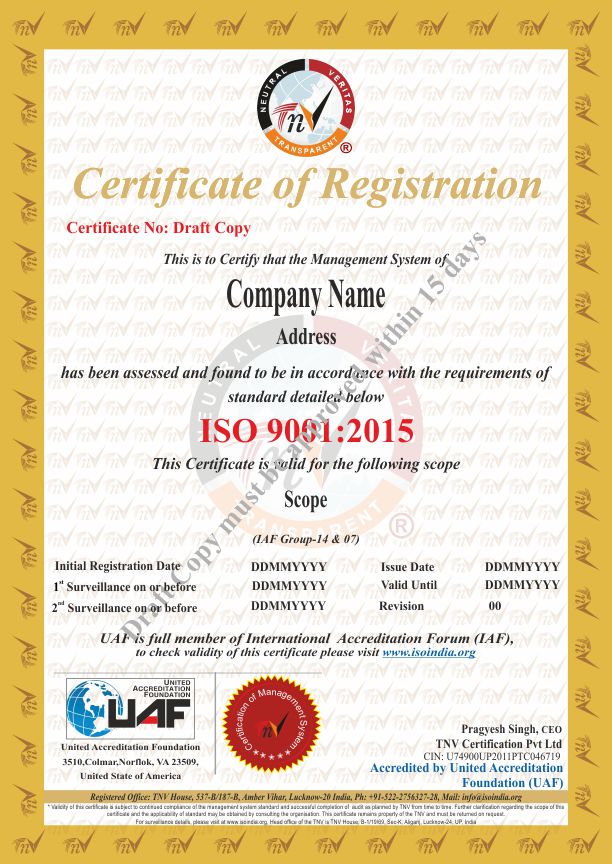
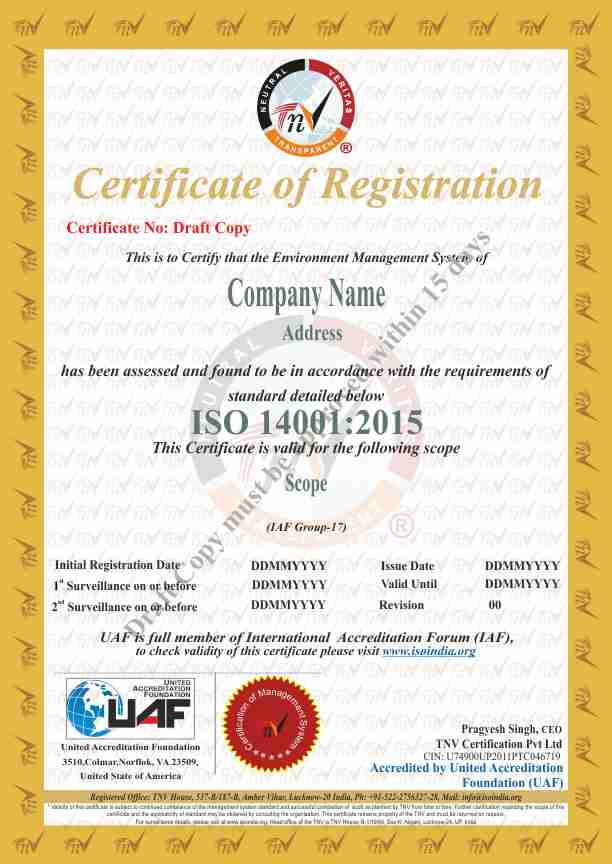
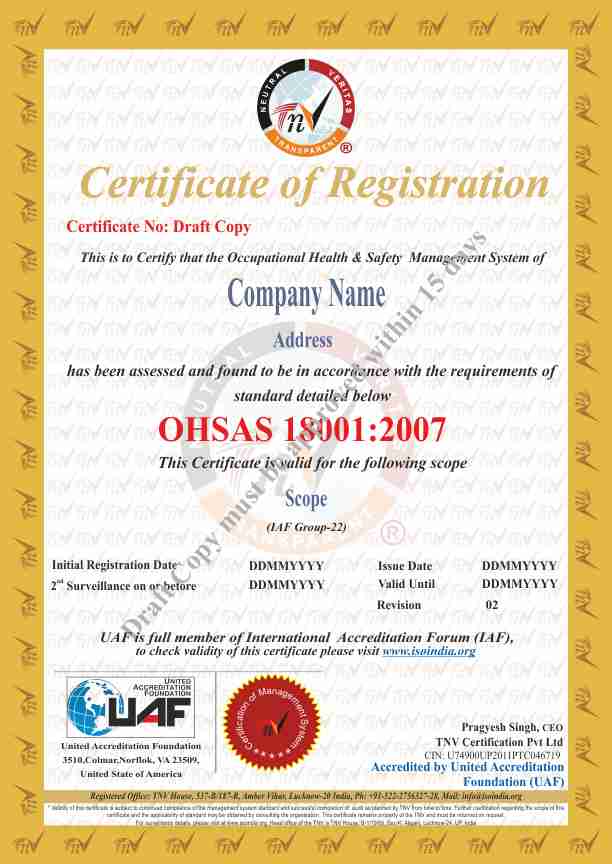
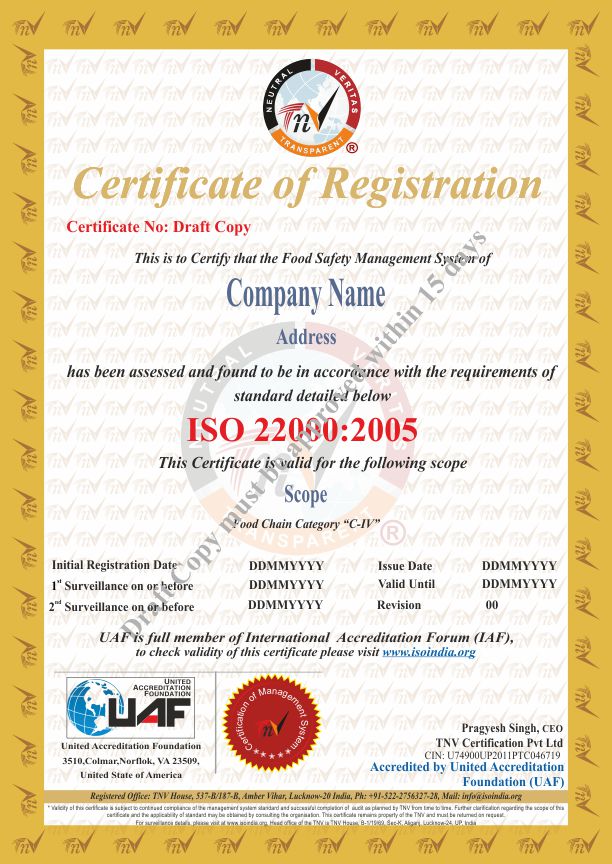
.jpg)
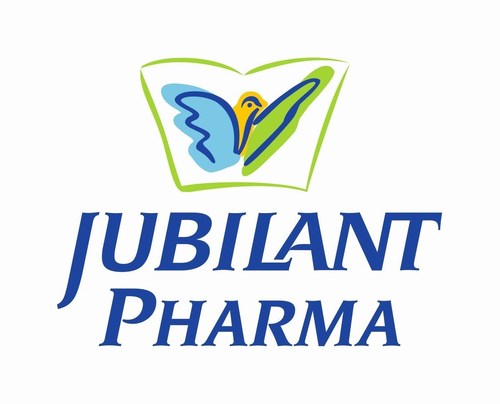 Sanjeev Sharma
Sanjeev Sharma
We are Certified by TNV since last 6 years and we are absolutely happy and satisfied with the systematic approach of the Team. Best Wishes.
»
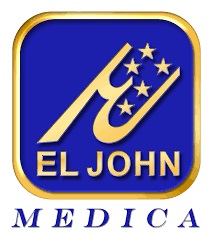 PT. Sun Health Care
PT. Sun Health Care
As always it was an excellent input that we got from TNV, looking forward to continuing a relationship with them. The assessment was very much a structured approach. Our team learned a lot Ari Rahmawati Director of PT Sun Health Care (El John Medica) »
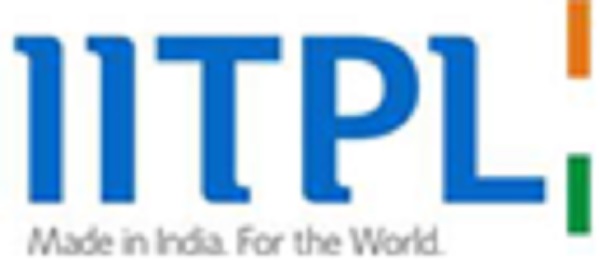 Innovation Imaging Technologies Pvt. Ltd
Innovation Imaging Technologies Pvt. Ltd
"May I take this opportunity to thank you for all your help in the arrangements and organisation for the Training of MD QMS Lead Auditor Certification Course attended. The course was very informative and structured to our requirements. I feel that the relationship that has been b »
 SSP Tech Consultancy Malaysia
SSP Tech Consultancy Malaysia
SSP Tech Consultancy Malaysia is so proud on the long lasting relationship with TNV Certification PVT LTD.
We have been working with TNV since 2010 and there were more than 80 clients have been certified in the field of ISO9001 , ISO14001, ISO45001 & ISO 13485.
We thank you For »
 Maria P. Belyanchikova
Maria P. Belyanchikova
Dear Sir,
We kindly express gratitude for your
outstanding service and long-lasting
cooperation.
Since 2014 our companies in Russia, Moscow,
and United Arad Emirates, Dubai, have several
times ordered certification, surveillance and
audit from TNV Certification Pvt LTD and »
 Unnikrishnan Narayanan Namboodiri
Unnikrishnan Narayanan Namboodiri
Dear Sir,
It is with great pleasure that we at Inspirit Safety Solutions Pvt Ltd, are conveying our gratitude and appreciation to TNV Certification Pvt Ltd for providing the best of services in the domain of
Management System trainings and certifications by accepting us as an a »

I have developed a great relationship with TNV Certification Pvt LTD.
I have undergone a few trainings with TNV training team & have
found their approach to be a highly professional & committed to
providing quality trainings & certifications. I am glad that I also have
had th »







